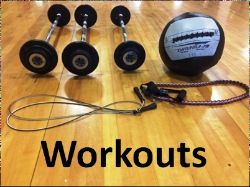Quote of the day: "People often say that motivation doesn't last. Well, neither does bathing - that's why we recommend it daily." -Zig Zigler
Article of the day: click, print, and hit the pool! Swimming is the perfect summer workout to get you fit in no time! http://www.womenshealthmag.com/fitness/swimmers-workout
According to the food guide pyramid, carbohydrates should make up the biggest percentage of our daily nutritional intake (45%-64%). However, the low carb/no carb craze has given carbohydrates a bad reputation. They are like the leper of the food world, with no one wanting to come within a ten foot radius of them! But is that completely necessary? Are we all forever doomed to have to skip over the rolls at dinner, and stare longingly at our favorite dessert? For a while, all we heard about was the Atkins Diet, then came the “Zone Diet,” next was the “South Beach Diet,” and now it’s the “High Protein diet.” So what is a low-carb diet exactly?
Definition: A low-carb diet limits carbohydrates — such as bread, grains, rice, starchy vegetables and fruit — and emphasizes sources of protein and fat. Many types of low-carb diets exist, each with varying restrictions on the types and amounts of carbohydrates. Examples of low-carb diets include the Atkins diet and the Zone diet. (mayoclinic.com)
What most people really want to know is: Will a low carb diet help me lose weight and is it safe?
Will it help you lose weight?
Yes and No. In the short run, a low carb diet CAN help you lose weight, but this weight is often water weight and is regained after you reintroduce carbs to your diet. When you drastically restrict carbohydrates, the body goes into a different metabolic state called ketosis. During Ketosis, the body burns its own fat for fuel, instead of carbohydrates (which is normally your bodies’ main source of fuel). When the body is in ketosis, you usually feel less hungry, and therefore are likely to consume less food. However, during Ketosis your body forms substances called ketones; these can cause organs to fail, cause kidney stones or kidney failure, or result in gout. Ketones are usually a result of eating less than 100 grams of carbohydrates a day. With this type of diet, your body changes from a carbohydrate-burning engine into a fat-burning engine. So we want to burn fat, but there are some pretty severe consequences of eating this way. (Web MD.com)
Dangers of a Low Carb Diet
- Kidney Failure- Consuming too much protein can put extra strain on the kidneys, and make some individuals susceptible to kidney failure.
- High Cholesterol- Many people assume that as long as they don’t eat carbs, they can eat whatever else they want; including high fat/high cholesterol foods like red meat and full fat dairy products. Scientists have found that high cholesterol can lead to other health problems like heart disease, stroke and cancer.
- Osteoporosis and Kidney Stones- Low-carb diets have also been shown to make individuals excrete more calcium from their urine than normal leading to osteoporosis and kidney stones.
- Cancer- Since people on low-carb diets often cut out foods such as fruits, vegetables and whole grains, they often miss out on many cancer fighting vitamins and minerals.
- Unhealthy metabolic state called Ketosis (see above)
Now, I’m not giving you a mandate to go out and eat 5 rolls at dinner or 2 cupcakes for dessert. Remember, simple carbohydrates like white bread, cake and candy still turn into sugar in your body and are often stored as fat if not burned off by physical activity. The food guide pyramid recommends that between 45%-65% of your daily intake come from carbohydrates, 20%-35% from fat, and 10%-35% from protein. I try and stay at the higher end for protein and the lower end for carbs. I also try and make sure my carbs come from complex carbohydrates like whole grain bread, whole grain rice, vegetables, and fruit. When I don’t take in enough carbs, I often feel lethargic and don’t have enough energy for my workouts. So you don't have to cut carbs completely, just eat healthy complex carbohydrates whenever possible!
Everyone is different. There is no one perfect diet that works for everyone, so you have to listen to your body and make sure you are feeding it healthy nutritiously dense food! I hope this answers some of your questions about low-carb diets! Please feel free to post any additional questions!! If I don’t know the answer, I will try and find it for you.
Yours truly,
Lauren G.
share this on » |

















